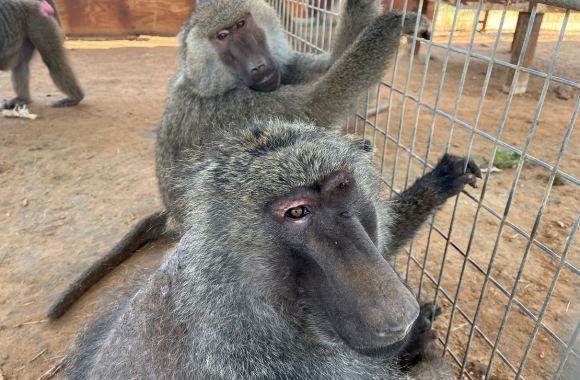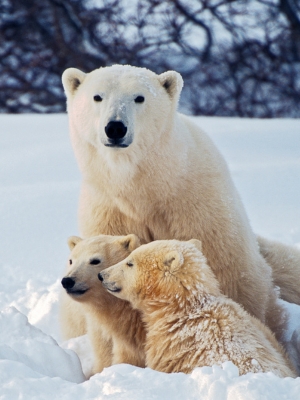When I left the sanctuary to go on parental leave in November last year, I was sure to walk the whole of the site to say goodbye to the monkeys. My final stop was at Darwin’s enclosure. I was going to miss him more than anyone while I was away.
As ever, Darwin came ambling to the fence line to see me, his arthritic gait giving him his distinctive “swagger.” He excitedly shifted from foot to foot and grasped his thigh in anticipation of my arrival – a behavior particular to him when he was excited or happy. As we spent a companiable moment together, I told him I would be back really soon.
I didn’t know then that it would be the last time I would see my friend.
Two weeks before I was due back, I received the heartbreaking call – Darwin had passed suddenly. He did not suffer and went peacefully in his sleep at the end of a long life. For that, all who loved him are grateful.
From Former Pet to “The Guy with the Egg”
Darwin was an olive baboon who had spent his formative years being kept as a “pet.” We know very little about the first years of his life, other than he was stolen from his mom in his first few weeks to be sold. This trauma impacted him for the rest of his life. He arrived at our sanctuary in 2001 at around six years old.
Darwin was best known as “the guy with the egg.” His prized possession was a large, red, plastic egg, which he took everywhere. It was not unusual to pass Darwin’s enclosure and see him sitting atop his egg, like an unusually large and odd-looking roosting hen, watching the world go by. If not sitting on it, he might be happily pushing his egg ahead of him like a soccer player, or simply hugging it close to him as he sat, ate, or slept. While he lived largely uneventfully alongside his enclosure mates, woe betide anyone who came between him and his precious egg. If anyone tried, they would be screamed at or have pebbles thrown at them by a furious Darwin.
Darwin Bore the Consequences of Life as Pet
Because of his lack of early contact with other baboons and his unnatural exposure to humans, Darwin stood out as unusual. His behavior was not that of an adult male baboon, but more like that of a young adolescent. He lacked social skills and did not know how to respond properly to his enclosure mates. This might mean throwing a screaming fit if someone interacted with him (or his egg) in a way he didn’t like, or getting into fights when he became overstimulated or scared.
Instead of baboon friends, Darwin was a monkey who sought out his caregivers for friendship and comfort. As a rule, we do not physically interact with the monkeys under our care, both for safety reasons and to ensure our team does not impact their ability to develop bonds within their social group. We believe that the greatest achievement in caring for ex-pet primates is when they ignore us and instead pursue friendships with other monkeys. Darwin struggled to interact meaningfully with other baboons. Instead, he craved the attention and companionship of the humans in his life. For Darwin, these interactions brought him joy.
Darwin’s trust in his caregivers was so strong that, when he required injectable medication for his progressing arthritis, he held out his arm through the fence and allowed us to administer the unpleasant jab without any prior positive enforcement training. He winced as the needle went in but held his arm perfectly still and waited patiently for his banana reward. I like to think he knew that we would never do anything to harm him.

Darwin’s Passing Leaves a Void at the Sanctuary
In his final years, Darwin’s health began to deteriorate. Arthritis impacted his spine and legs, making movement more laborious. He lost some of his lustrous fur and had one of his eyes removed as it lost its sight and began to irritate him. Despite this, he was still the same handsome, joyful baboon we had always known. His already limited interactions with other baboons gradually became fewer as he chose to spend more time on his own exploring his large enclosure or spending quality time with his egg and caregivers.
On the sad morning that he was found, he was curled up in his warm sleeping box with his egg, his body still warm to the touch but his absence leaving a space at the sanctuary that will never be filled.
We Honor Darwin and Countless Animals Like Him Who Suffered as Pets
While all who knew him cherished our time with him – our baboon friend with a love of plastic eggs and humans – we know he should have been raised by his mom in a troop of dozens of others. He should have never struggled to understand how to behave around other baboons and rather have spent his days in happy companionship with those of his own kind.
There will never be another Darwin, but until the pet trade ends, more like him will suffer. In Darwin’s memory and in honor of every other precious life we are responsible for at our sanctuary, we will continue to fight the cruel trade that denied him and so many others their freedom.
Keep Wildlife in the Wild,
Liz

 Dear Reader,
Dear Reader,